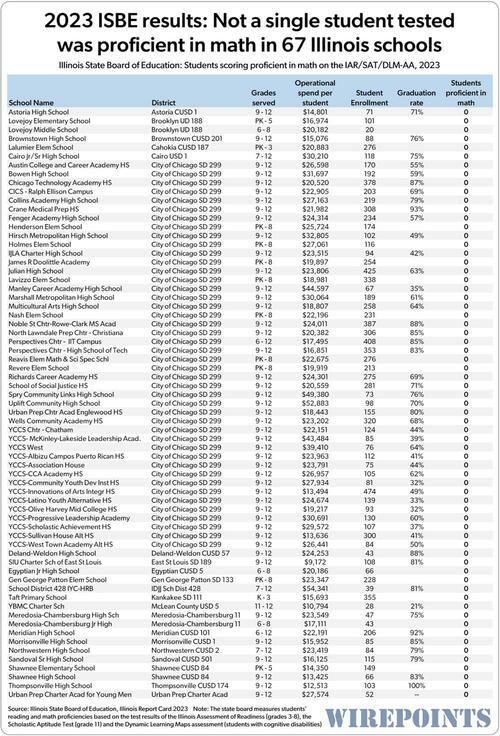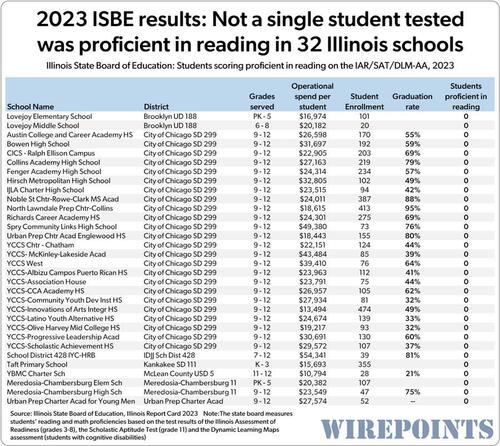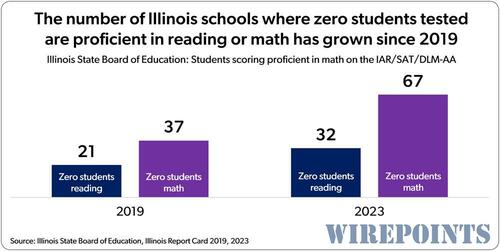
By Ted Dabrowski and John Klingner of Wirepoints
Last week, Elon Musk, Vivek Ramaswamy, and Jordan Peterson helped expose the failures of Illinois’ public education system on X. Their engagement with a Wirepoints report, “Illinois education 2022: Not a single student can do math at grade level in 53 schools. For reading, it’s 30 schools,” revealed the thousands of students trapped in completely failing schools in 2022.
But those results are now old news. Wirepoints has just run the new Illinois State Board of Education (ISBE) 2023 Report Card data and the outcomes are worse even though the impacts of covid are another year behind us.
In 2023, there were 67 Illinois schools where not a single student tested proficient in math and 32 where no student tested proficient in reading. What’s worse, officials in those schools graduated nearly 70% of their students.
More than 12,000 students attend Illinois’ zero-proficiency schools. Every single one of those children will struggle in life because they lack basic reading and math skills.
Take Collins Academy High School on Chicago’s West Side. With 219 students and 55 employees, Collins spends $27,163 per student. The Illinois State Board of Education declares the school “commendable,” the state’s 2nd-highest rating. Not a single student tested was proficient in reading or math in 2023. And yet 79% of students there graduated.
Nearby North Lawndale Prep Charter-Christiana spends over $20,000 for each of its 308 students. It’s also rated “commendable” by the state. Not a single student tested was proficient in math and only 1 student tested proficient in reading. The graduation rate? 85 percent.
Far to the south, about 60 miles west of the state’s capital of Springfield, there’s the three-school district of Meredosia-Chambersburg 11. Not a single student tested at the elementary school could read at grade level. At the middle school, none were proficient in math. And in Meredosia-Chambersburg High School, where 75 percent of students graduated, not a single student tested was proficient in either reading or math.
Teaching students the basics of reading and math is the bare minimum function of an education system. Unfortunately, an increasing number of Illinois schools can’t even accomplish that.
Pre-covid, there were 21 zero-reading schools and 37 zero-math schools in Illinois. In 2023, that grew to 32 and 67, respectively.
Wirepoints’ count of zero-proficiency schools is based on data straight from ISBE’s 2023 Illinois Report Card. The state board measures students’ reading and math proficiencies based on the test results of the Illinois Assessment of Readiness (grades 3-8), the Scholastic Aptitude Test (grade 11) and the Dynamic Learning Maps assessment (students with cognitive disabilities).
It’s important to note that many of the schools on the two lists above are part of Chicago’s Youth Connection Charter School network – schools that target dropouts and other at-risk students. For sure, educating those students represents an additional challenge, but that’s no excuse for such dismal outcomes. They can’t even get one kid to proficiency? Even in these schools, officials still end up graduating nearly 50% of students despite their total lack of proficiency in reading or math.
Illinois’ education system is failing its students
Wirepoints’ analysis above focuses only on the Illinois schools where zero of kids were able to read or do math out of the more than 3,500 schools (grades 3 through 12) that test their students every year.
But we could have just as easily looked at the 408 schools where only 1 out of 10 kids or fewer can read at grade level. Or the 873 schools where just 1 out 10 kids or fewer can do math. That’s 12% and 25% of all grade 3-12 schools in the state, respectively.
In a sane world, a system that spends $24,000 per child, all-in, would be held accountable for such dismal failures. And schools that don’t and can’t teach a single student the most basic of skills would be shut down or at least subject to extreme intervention.
But in Illinois, such schools carry on, the system thrives, and students suffer.
By Ted Dabrowski and John Klingner of Wirepoints
Last week, Elon Musk, Vivek Ramaswamy, and Jordan Peterson helped expose the failures of Illinois’ public education system on X. Their engagement with a Wirepoints report, “Illinois education 2022: Not a single student can do math at grade level in 53 schools. For reading, it’s 30 schools,” revealed the thousands of students trapped in completely failing schools in 2022.
But those results are now old news. Wirepoints has just run the new Illinois State Board of Education (ISBE) 2023 Report Card data and the outcomes are worse even though the impacts of covid are another year behind us.
In 2023, there were 67 Illinois schools where not a single student tested proficient in math and 32 where no student tested proficient in reading. What’s worse, officials in those schools graduated nearly 70% of their students.
More than 12,000 students attend Illinois’ zero-proficiency schools. Every single one of those children will struggle in life because they lack basic reading and math skills.
Take Collins Academy High School on Chicago’s West Side. With 219 students and 55 employees, Collins spends $27,163 per student. The Illinois State Board of Education declares the school “commendable,” the state’s 2nd-highest rating. Not a single student tested was proficient in reading or math in 2023. And yet 79% of students there graduated.
Nearby North Lawndale Prep Charter-Christiana spends over $20,000 for each of its 308 students. It’s also rated “commendable” by the state. Not a single student tested was proficient in math and only 1 student tested proficient in reading. The graduation rate? 85 percent.
Far to the south, about 60 miles west of the state’s capital of Springfield, there’s the three-school district of Meredosia-Chambersburg 11. Not a single student tested at the elementary school could read at grade level. At the middle school, none were proficient in math. And in Meredosia-Chambersburg High School, where 75 percent of students graduated, not a single student tested was proficient in either reading or math.
Teaching students the basics of reading and math is the bare minimum function of an education system. Unfortunately, an increasing number of Illinois schools can’t even accomplish that.
Pre-covid, there were 21 zero-reading schools and 37 zero-math schools in Illinois. In 2023, that grew to 32 and 67, respectively.
Wirepoints’ count of zero-proficiency schools is based on data straight from ISBE’s 2023 Illinois Report Card. The state board measures students’ reading and math proficiencies based on the test results of the Illinois Assessment of Readiness (grades 3-8), the Scholastic Aptitude Test (grade 11) and the Dynamic Learning Maps assessment (students with cognitive disabilities).
It’s important to note that many of the schools on the two lists above are part of Chicago’s Youth Connection Charter School network – schools that target dropouts and other at-risk students. For sure, educating those students represents an additional challenge, but that’s no excuse for such dismal outcomes. They can’t even get one kid to proficiency? Even in these schools, officials still end up graduating nearly 50% of students despite their total lack of proficiency in reading or math.
Illinois’ education system is failing its students
Wirepoints’ analysis above focuses only on the Illinois schools where zero of kids were able to read or do math out of the more than 3,500 schools (grades 3 through 12) that test their students every year.
But we could have just as easily looked at the 408 schools where only 1 out of 10 kids or fewer can read at grade level. Or the 873 schools where just 1 out 10 kids or fewer can do math. That’s 12% and 25% of all grade 3-12 schools in the state, respectively.
In a sane world, a system that spends $24,000 per child, all-in, would be held accountable for such dismal failures. And schools that don’t and can’t teach a single student the most basic of skills would be shut down or at least subject to extreme intervention.
But in Illinois, such schools carry on, the system thrives, and students suffer.
Loading…







